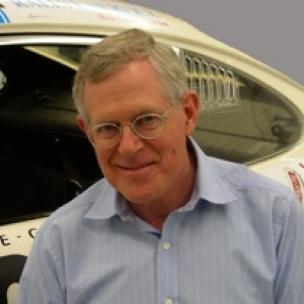Reilly P. Brennan, Lecturer, Stanford University

Reilly P. Brennan has been a core member of Stanford's automotive community since joining as Executive Director of the Revs automotive research program in 2012. He is a founding partner at Trucks, a seed-stage venture capital fund for entrepreneurs changing the future of transportation. Reilly holds a teaching appointment at Stanford University, where he teaches twice per year in the School of Engineering and the d.school. His classes bridge the fields of transportation, design and entrepreneurship. He is a dedicated educator and advisor to young researchers and entrepreneurs, actively participating in mentorship roles at Techstars Mobility and the University of Michigan.
His influential newsletter FoT is a radar for what's happening in transportation (link).
Prior to Trucks, Reilly was Executive Director for Stanford's automotive research program, Revs. Prior to Stanford he developed his love for transportation in media and technology at editorial publications ranging from Automobile to AOL to Monocle and seat time in over 1000 test cars. He was a member of the Le Mans-winning factory Corvette C5-R program. His personal land speed record is 168 mph, behind the wheel of a Chaparral 2E.
Understanding Corrosion and Preservation of Automobile Surfaces
d.school: Understanding Superfans and Their Heroes, Judging Historical Significance: The Automobile, ME302C: Mobility Entrepreneurship
Miles C. Collier, Business Executive, Artist and Philanthropist

Miles C. Collier, a retired business executive, is a practicing artist, investor, philanthropist, and a noted authority on vintage automobiles. He is the founder of the Revs Institute for Automotive Research in Naples as well as the founding supporter of the Revs Program at Stanford. For the last ten years, Mr. Collier has conducted a biennial symposium on Connoisseurship and the Collectible Automobile that brings together automobile collectors and faculty from around the world to discuss critical issues in collecting and preserving important historic automobiles. Mr. Collier’s interest in art was nurtured at Yale University where he received a Bachelor’s Degree in Painting. An MBA from Columbia University, his business career was culminated after 25 years as Managing Partner of Collier Enterprises. In 1996, he entered the New York Studio School of Drawing, Painting and Sculpture, where he studied for three years with the noted Graham Nickson. Today, he paints professionally and his special interest is in issues relating to visual perception. He serves as Chairman of the Board of Trustees of Eckerd College, a small private liberal arts college with a national reputation. His interest in education and philanthropy is concentrated in the post-secondary arena.
Mathias Crawford, Graduate Student, Communication

Mathias Crawford is a Ph.D. student in the Department of Communication at Stanford University, and is a Stanford Graduate Fellow and a Values in Design Fellow. Crawford is interested in the interplay between virtual representations of the world as communicated through games, and the manner in which these abstractions of the world become reflected in the real world: how they have impacted the types of organizations, social interactions and technologies that are experienced in the world. His current research on the history of commercial simulator technologies examines the development of car racing video games over the past four decades. As an undergrad at Harvard University he balanced his academic pursuits with the absolute domination of his roommates in Gran Turismo 3 and 4.
Owen Falk, Graduate Student in Chemical Engineering

Owen Falk is a MS student in Chemical Engineering at Stanford University who collaborates with professors from the Material Science and Engineering Department as well as the Chemical Engineering Department at Stanford. His research focuses on the intersection of cars and chemistry. His initial Revs research looked at corrosion taking place in the 1952 Cunningham C-4RK race car; his work will continue to investigate methods of preserving cars with lacquer finishes, as well as developing methods for nondestructive analysis of the molecular composition of automotive finishes. He also works with Professor Chris Gerdes to analyze data taken from Revs Program vehicles.
Understanding Corrosion and Preservation of Automobile Surfaces
Jon Feiber, Consulting Associate Professor, d.school; General Partner, Mohr Davidow Ventures

Jon Feiber joined Mohr Davidow Ventures in 1991 where his primary focus is networking and computing systems investments. In more than 20 years of venture investing he has identified and guided numerous entrepreneurs and played a significant role in growing category-leading companies. Feiber launched his career at Amdahl where he served as a Senior Engineer. He joined Sun Microsystems in 1983 where he worked in managerial positions overseeing product development and strategy in the areas of software development, software engineering technologies and networking. When he left Sun to join MDV he was Sun’s Vice President of Networking. Feiber is a member of the Caltech Information Science and Technology Advisory Board and an advisor to the Revs Program.
Gary Geisler, User Experience Designer, Stanford Libraries

Gary Geisler is a user experience researcher and designer in Stanford's Digital Library Systems and Services group and the primary developer of the Revs Program at Stanford website. His work at Stanford has focused on user experience design and front-end development for a range of digital library applications, including the Revs Digital Library and Stanford University Library Exhibits. Prior to joining Stanford, Gary was a professor at the University of Texas at Austin and at Simmons College in Boston, where he taught graduate courses, served as principal- or co-investigator on several funded grant projects, authored or co-authored many academic publications, and consulted on a range of digital library projects. Before going to graduate school, Gary worked as a software engineer at IBM in Research Triangle Park, NC.
J. Christian Gerdes, Director Revs Program at Stanford, Center for Automotive Research at Stanford (CARS), Director Dynamic Design Lab

Professor Gerdes' research centers on the application of dynamic modeling to problems in nonlinear control, estimation and diagnostics. Specific areas of interest include the development of driver assistance systems for lane keeping and collision avoidance, modeling and control of novel combustion processes for Internal Combustion engines and diagnostics for automotive drive-by-wire systems. Prior to joining Stanford, Professor Gerdes was the project leader for vehicle dynamics at the Vehicle Systems Technology Center of Daimler-Benz Research and Technology North America. His work at Daimler focused on safety analysis and simulation-based design of heavy trucks for the Freightliner Corporation. He leads the Revs research team looking at the inner workings of the driver through physiological data synchronized with a suite of mechanical data from the vehicle.
McKeel Hagerty, CEO, Hagerty Insurance

McKeel Hagerty restored his first car-a 1967 Porsche 911S-at age 13, igniting a passion for collector cars. He is chief executive of Hagerty Insurance, a family-run business headquartered in Traverse City, Michigan that is the largest insurer of classic and collector cars. Not only does he participate in the world’s greatest collector car events, including the Mille Miglia, the Colorado Grand, etc., he also serves on numerous boards, advisory groups and judges at a number of Concours. Hagerty helped establish the Collectors Foundation and the Historic Vehicle Association. He also publishes Hagerty magazine and appears regularly as a national media resource. Hagerty is an advisor to the Revs Program.
Lene Harbott, Research Associate

Lene has been at Stanford University since 2006, using electroencephalography (EEG) to investigate how brain activity is related to a person’s external environment. She is currently working with Professor Chris Gerdes to investigate driver’s physiological responses while interacting with a vehicle in a variety of different driving conditions. In this way Harbott is excited to be able to apply her extensive knowledge of neurophysiology to her love of cars, inherited from her automotive-fanatic father and grandfather. Growing up near the village of Silverstone (home of the British Grand Prix circuit) she spent her formative years watching both modern and classic car races and is thrilled to have the opportunity to work with some of the world’s most beautiful classic cars, as well as vehicles at the cutting edge of automotive innovation.
Joe Hustein, Lecturer in Mechanical Engineering-Design, Co-Director, Revs Program

Joe Hustein’s teaching focuses on the interplay of law, business, and intellectual property with a special emphasis on the design and commercialization of technology. He has been involved with the d.school and guest lectured in several departments at Stanford. Besides decades of experience practicing law and advising companies, he has taught for many years and was a long-time technology columnist. Prior to law, he obtained degrees in industrial design where he concentrated on vehicle design and electrical engineering where he worked on the US space program. Consistent with his multi-disciplinary background, his philosophy is that disparate collaborators can achieve breakthroughs in wonderfully synergistic ways. He’s always been a car enthusiast and for the last ten years has played key roles managing the Palo Alto Concours d’ Elegance.
